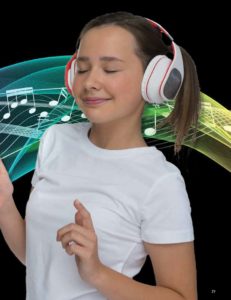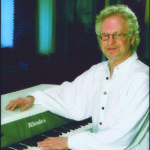ADHD, Brain Balancing Music, and Mindfulness
Steven Halpern
Download PDF
New Breakthroughs and Resources
 OF ALL THE OPTIONS TO HELP PEOPLE WITH ADHD live better lives and be more functional members of society, one of the most overlooked is the use of music. As you will see, there is a good reason for this; “regular” music doesn’t work. Most traditional music is intended for entertainment or emotional reasons. It’s not composed with the appropriate structure, tones, or intention of orchestrating a stress-reducing, balanced whole-brain response in the listener, especially individuals with ADHD.
OF ALL THE OPTIONS TO HELP PEOPLE WITH ADHD live better lives and be more functional members of society, one of the most overlooked is the use of music. As you will see, there is a good reason for this; “regular” music doesn’t work. Most traditional music is intended for entertainment or emotional reasons. It’s not composed with the appropriate structure, tones, or intention of orchestrating a stress-reducing, balanced whole-brain response in the listener, especially individuals with ADHD.
The good news is that there is a new genre of music composed with the brain in mind. It has demonstrated significant effectiveness over forty years for a wide range of individuals and ages, including the population affected by ADHD. Although evidence-based research is largely anecdotal, there have also been several landmark brainwave biofeedback (EEG) studies that demonstrate the unique properties of these recordings
But even to call it “music” does it a disservice. I suggest it is acoustic neurotechnology delivered in the form of beautiful, relaxing music. I also call it Brain Balancing Music for Mindfulness™ (BBMM). Creating a new contemporary genre is a daunting task for an indie record label with limited budget, and that’s one of the reasons you haven’t heard of this breakthrough before.
Full disclosure: The reason I’ve devoted my professional career to developing this resource is personal—I needed to find an effective nonpharmaceutical alternative to help me manage my own ADHD profile. It’s worked for over forty years!
As more individuals learn of its existence, I hope that additional real-world and clinical testing will confirm the results of the pilot studies and testimonials.
Why most music creates stress and is antithetical to mindfulness
Unknown to most people, familiar music can add to one’s stress level without their awareness. A person’s heartbeat entrains (synchronizes) to the beat of the music, which may not be optimized for that individual. The sounds of the instruments themselves can be irritating to sensitive nervous systems.
Because we are surrounded by music from birth, our brains are trained to unconsciously recognize melody and harmonic structure, and are manipulated into predicting where the music is going in the future.
Relaxation and mindfulness, however, require your awareness to focus on the present moment.
Space precludes me from going into greater detail, but my brief Scalus Interruptus video demonstrates how this phenomenon affects your breath and attention. You can watch the video on YouTube.
Long before David soothed King Saul with his harp, music was revered for its healing powers. It’s time to update and repurpose this ancient art for our needs in the 21st century. To benefit, all you need to do is listen, as background, foreground, or with headphones.
There aren’t many references to the use of music in the literature, and the ones I’ve seen have been too generic to be of much help. Pharmaceutical companies aren’t funding research studies, and I know from firsthand experience there is a strong bias in academia about even allowing such research to be conducted.
Because my music naturally evokes a state of mindful awareness, I believe the research into mindfulness and ADHD done at UCLA by Diana Winston, suggests a new contextual framework within which to understand how this music works. Mindfulness research supports Dr. Herbert Benson’s research at Harvard into the “relaxation response,” and supports landmark biofeedback research in 1973 and 1977 that first demonstrated the special nature of my brain balancing music.
How is mindful music different?
With mindful music, the soothing tones immediately put your body and mind at ease. There are no harsh or shrill sounds, no sharp edges, no dissonance. Your attention is allowed to focus on the present moment rather than anticipating the future.
The latest research in the field of epigenetics, first reported by Bruce Lipton, PhD, in The Biology of Belief (Hay House; tenth anniversary edition, 2016) and more recently expanded upon in by Deepak Chopra, MD, and Rudy Tanzi, PhD, in Super Genes (Harmony, 2017), describes the self-organizing principles of the “human instrument” when provided with the proper stimuli. Mindful music supports the innate healing energies built into our cellular biology and DNA.
Lab results are useful, but nothing matches the feeling I got of the transformative power of my recordings. After my presentation of this material at a conference some years back, a family came up to me. The husband said, “Your music has saved our family. Our seven-year-old son was often out of control, with frequent tantrums. But within seconds of playing your albums Chakra Suite or Ocean Suite, he calms down. It’s been a lifesaver for us.”
“Your music increases students’ attention span and calms their nervous system,” wrote Jessie Landsberg, PhD, a psychologist who studied the effects of music in the classroom. “It seems to settle the environment as well as the physical and emotional state of the students so that learning can take place. We did not see this effect when we used classical music.”
There is a long and continually growing body of evidence to support the use of brain-balancing mindfulness music. My latest projects include a program combining my music with positive affirmations for ADHD, which are mixed inaudibly (subliminally) into the soundtrack for heightened benefits.
Might this music work for you, your family or your clients? Isn’t it worth a try? Highly affordable and easy to use, there’s no downside; the only side effects are positive ones.
 Steven Halpern, PhD, is an award-winning, Grammy-nominated composer, recording artist, researcher, and educator. From his pioneering brainwave biofeedback research in 1973 to his latest recordings, he has continued to create a new category of music that has helped many individuals live and work more effectively. His innovative compositions offer unique benefits to the ADHD community. Read more about his music at www.StevenHalpern.com and find a collection of the most recommended albums. Most of his music is also available at Amazon, iTunes, and Spotify. To watch his “Scalus Interruptus” video on YouTube, go to https://www.youtube.com/watch?v=-Ml8KiWH_1E.
Steven Halpern, PhD, is an award-winning, Grammy-nominated composer, recording artist, researcher, and educator. From his pioneering brainwave biofeedback research in 1973 to his latest recordings, he has continued to create a new category of music that has helped many individuals live and work more effectively. His innovative compositions offer unique benefits to the ADHD community. Read more about his music at www.StevenHalpern.com and find a collection of the most recommended albums. Most of his music is also available at Amazon, iTunes, and Spotify. To watch his “Scalus Interruptus” video on YouTube, go to https://www.youtube.com/watch?v=-Ml8KiWH_1E.
Other Articles in this Edition
Peaks and Troughs: Uneven Medication Coverage & ADHD
Telemental Health: Benefits and Potential Pitfalls
ADHD, Brain Balancing Music, and Mindfulness
Overcoming the Immunity to Intelligence
Engagement: Making Educational Content “Stick” Through Technology
Giftedness & ADHD: A Strengths-Based Perspective and Approach
Everything I Know I Learned in Kindergarten
Harness Fidgeting to Improve Focus
Itchy Tags, Bothersome Seams, and Tight Waistbands… Oh My!
Tips for Organizing Your Home (Webinar guest: Susan Pinsky)
Helping Students with ADHD in the Classroom (Webinar Guest: Sydney Zentall, PhD )
Questions About ADHD Medication
